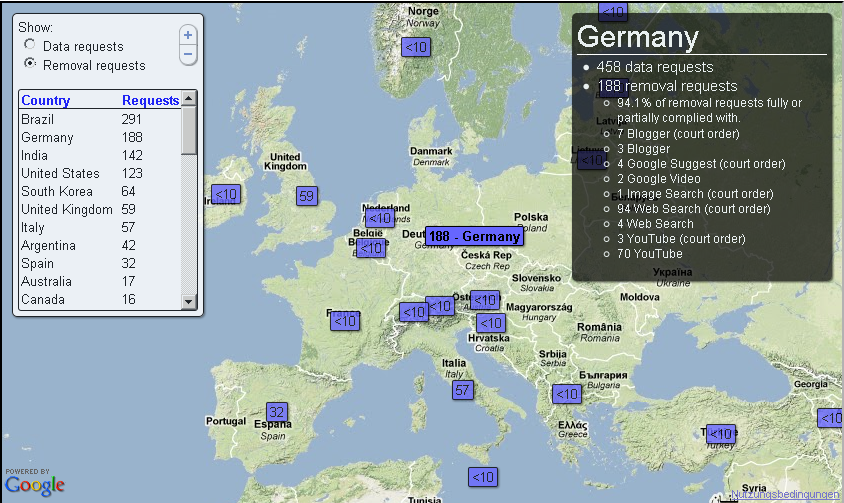 |
21. January 2011 – 10:15 by Bengt Feil (TuTech Innovation GmbH)
|
 Yesterday Eric Schmidt stepped down as CEO of Google and he will act as the executive chair starting April 2010. The founder Larry Page will take over the day-to-day operations of the company (Sergey Brin will mainly focus on product development from now on). The impacts of these changes are discussed all over the web and I will not try to do that here.
Yesterday Eric Schmidt stepped down as CEO of Google and he will act as the executive chair starting April 2010. The founder Larry Page will take over the day-to-day operations of the company (Sergey Brin will mainly focus on product development from now on). The impacts of these changes are discussed all over the web and I will not try to do that here.
But there is another interesting angle on this whole issue. In his role as executive chair Mr Schmidt will be working on Government relations more heavily than before which might have a major impact on how the net is regulated and how Google interacts with government – which in turn could influence the field of eParticipation.
Taking this into account it makes sense to take a look at what Mr Schmidt said about his plans in terms of government relations. In the Q4 2010 Earnings Call he stated that he thinks that the problems Google had with governments in last few years (accidental collection of wifi data or the Streetview debate in Germany) might stem from the fact that “people don´t really understand what we really do and what we don´t do”. He follows up with the statement that the core strategy will be do communicate more intensely with regulators and government – “We are trying to be as transparent and collaborative as possible”. He also makes clear that Google thinks that regulators have an important job to do and that “they are there for a reason and we respect that”.
While Mr Schmidt makes clear that there is a need for more communication between government and the company he also says that he thinks that what Google does is “very pro competitive” – answering the complains that Google might behave anti-competitive in some areas like for example favouring their own products in search results.
In summary it looks like if Mr Schmidt will be more active in working with governments in the next years and I would argue that it is good for both the company and governments. Without a doubt he is a very knowledgeable and straight discussion partner for governments and from a citizen’s point of view his involvement might help to both improve internet regulations and speed up the process towards them.
Picture from Techcrunch.com
Posted in News, Trends | No Comments »
 |
9. August 2010 – 15:00 by John Heaven (TuTech Innovation GmbH)
|

Call Centre, by vitorcastillo on Flickr
In the course of researching our keynote speakers for the PEP-NET Summit I came across two articles, one of which is very relevant to (e-)participation, and the other will be of interest to anyone working in or with the public sector. They both put a matter of conventional wisdom under the microscope: in one case, the assumption that bigger engagement excercises are always more valuable, and in the other, the idea that economies of scale improve efficiency. Hence, they both challenge the assumption that bigger is better.
So the message is not to go with the flow — unless it’s economies of flow you’re talking about. Confused? Then read on …
Read the rest of this entry »
Posted in News | No Comments »
 |
21. April 2010 – 11:37 by Bengt Feil (TuTech Innovation GmbH)
|
When we talk about transparency of government data we mostly mean data produced be government (in parliament etc.) which should be public and usable by NGOs and citizens alike. But there is another aspect of transparency which is discussed less often: How are governments using laws and power to request private data from companies and especially web-based companies like search engines and social networks?
Google published all requests for data and removal of content by governments in the second half 2009 on a website . The screenshot below shows the map on that site zoomed to Europe but there is data available for many other countries in the world.
 Click to enlarge
Click to enlarge
Some example numbers: In Germany there where 458 requests for private data and 188 request for removal of content in the second half of 2009. Ten of the removal requests where aimed that the Blogger service and 70 at Youtube. Interestingly Google also publishes the rate of compliance with these requests – which in this case is 94.1%. In other countries there were much more requests: Brazil leads the chart with 3663. For China however no data is available – or as Google says: “Chinese officials consider censorship demands as state secrets, so we cannot disclose that information at this time.“
This shows that there are other sides to government transparency than one might think about immediately. I hope other companies also publish this kind of data in such an accessible way so that we can hold our governments to task for extensive use of laws and power.
Posted in News, good practice | No Comments »
 |
5. June 2008 – 13:27 by Dan Jellinek
|
Here in the UK, central government has been quite good overall in funding e-participation projects and trials compared with many other European countries, from what I understand from talking to fellow Pep-Netters.
However, responsibility for e-participation policy has tended to be quite fragmented, with many different government departments and agencies having some interest and putting in some funding.
Those with some involvement in this field, for example, have included the Cabinet Office and various of its agencies; the Ministry of Justice (after the transfer of the former Home Office team looking at community cohesion); the Department for Communities and Local Government; and around the fringes, others including BERR for business involvement.
Work has been further fragmented by it being split between various one-off funds such as Digital Challenge, the Innovation Fund, and the former National Projects for Local E-Government, as well as other funds handled by the Ministry of Justice.
So while there has been a great deal of good work going on, it has often been confusing for organisations working in the field to know where to focus their efforts to obtain funding; and the highest profile casualty of the confusion looks now to be ICELE, the International Centre of Excellence for Local E-Government that was born out of the former National Project for Local E-Democracy.
Over the past year or so ICELE has been aware that its funding would be coming up for review, and more recently it has emerged that the government is considering finally pulling together the strands of its e-participation work into a new cross-government agency. What this has meant in practice however is that the whole thing has ground to a health, mired in internal political and bureaucratic debate; ICELE’s owner council, Lichfield council, has run out of time, money and patience; and the chair of ICELE Matthew Ellis has had to pull the plug on the whole project while the government works out what to do.
While in many ways it is a logical thing to try to pull all the strands together across government, and it was always a bit odd for a UK-focused body developed from a national project to become something termed ‘international’, it would be a huge shame if the good work ICELE has carried out over the past few years were to be lost, and the team that has been assembled disbanded altogether.
ICELE is a member of PEP-NET, and I understand that Fraser Henderson and others from the team will be able to continue participation in this project by working through Lichfield Council, whatever happens to ICELE. That is good news, and hopefully we can play a part therefore in ensuring ICELE’s legacy is a strong one.
We at E-Government Bulletin (www.headstar.com/egb) will track what happens with ICELE in ours news coverage as well, so those interested can follow it there; and perhaps ICELE will also post updates to this blog.
I would also be interested to hear what the situation is in other countries with regard to how the funding and encouragement of e-participation is handled (well or badly) by central government.
All the best,
Dan.
Posted in News, members | 3 Comments »
 Yesterday Eric Schmidt stepped down as CEO of Google and he will act as the executive chair starting April 2010. The founder Larry Page will take over the day-to-day operations of the company (Sergey Brin will mainly focus on product development from now on). The impacts of these changes are discussed all over the web and I will not try to do that here.
Yesterday Eric Schmidt stepped down as CEO of Google and he will act as the executive chair starting April 2010. The founder Larry Page will take over the day-to-day operations of the company (Sergey Brin will mainly focus on product development from now on). The impacts of these changes are discussed all over the web and I will not try to do that here.








